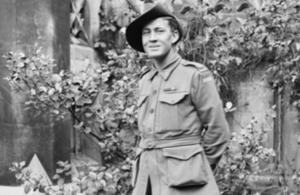WW1 Australian VC recipient Phillip Davey
The story of Australian First World War Victoria Cross recipient Phillip Davey.

Phillip Davey [Credit: Australian War Memorial D00067]
66 men from Australia received the Victoria Cross, Britain’s highest award for gallantry, during the First World War. As part of the Centenary Commemorations the people of the United Kingdom marked their gratitude to those courageous men by presenting a bronze memorial plaque to their home country engraved with their names. The plaque is now displayed at the Australian War Memorial. This archive tells their stories.
Name: Phillip Davey
DOB: 10 October 1896
Place of Birth: Unley, South Australia
Date of Action: 28 June 1918
Place of Action: Merris, France
Rank: Corporal
Regiment: 10th Battalion, Australian Imperial Force
Phillip Davey was born on 10 October 1896 in South Australia. He worked as a horse driver, before enlisting in the 10th Battalion of the Australian Imperial Force in December 1914. He was invalided out of Gallipoli, but rejoined his battalion on the Western Front in 1916. Davey was awarded the Military Medal in January 1918.
Corporal Davey was awarded the Victoria Cross for most conspicuous bravery and initiative in attack on 28 June 1918 at Merris, France. His platoon had come under heavy fire and the commander was killed with survivors sheltering in a ditch from heavy machine-gun fire. Davey attacked the gun with hand grenades. His citation explains:
Corporal Davey moved forward in the face of fierce point-blank fire, and attacked the gun with hand grenades, putting half the crew out of action. Having used all available grenades, he fetched a further supply and again attacked the gun, the crew of which had meantime been reinforced. He killed all eight of the crew and captured the gun, which he then used to repel a determined counter-attack, during which he was severely wounded. By his determination Corporal Davey saved the platoon from annihilation, and made it possible to consolidate and hold a position of vital importance to the success of the whole operation.
After the war, Davey worked for South Australian Railways. He died in 1953.